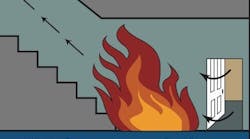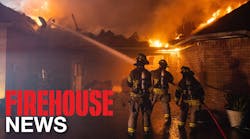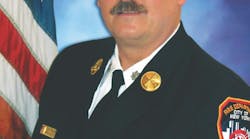Those blunt words come from a new study conducted by the Task Force on Emergency Responders, an independent panel sponsored by the Council on Foreign Relations. The 62-page report describes the nation's first responders as "drastically underfunded and dangerously unprepared" to cope with a major chemical, biological or nuclear incident. It calls for all levels of government to spend $98 billion more than is currently planned over the next five years to prepare fire, police and emergency medical services for their response to acts of terrorism.
This latest warning supports what leaders of the fire-rescue service have been saying for a decade since the first World Trade Center and Oklahoma City bombings. It has been 23 months since the 9/11 terrorist attacks and fire departments are still underfunded and understaffed - as they have been for many years. The threat of terrorism and the budget crisis facing most local governments only make it worse. At a time when they should be hiring more firefighters and spending more money on training and equipment, many jurisdictions are cutting their fire department budgets or barely maintaining the status quo.
The Council's study points to shortages of equipment and protective clothing, inadequate training and understaffing of fire companies as major problems facing first responders. It calls for local and state governments to increase their share of the funds that are needed, which is a great idea but not likely to happen. A bad economy has left the states and cities in desperate financial condition, and even when times were good, many cities and counties were unwilling to spend what they should on fire-rescue services.
The Council places the heaviest responsibility on the federal government. It recommends that the Department of Homeland Security (DHS) and other federal agencies spend five times the amount proposed in the 2004 budget. The report also calls for national standards to be established so that fire departments and other first response agencies can measure their level of preparedness against clear goals that have to be met. A spokesman for DHS said the Council's spending figures are "grossly inflated" and that DHS is in the process of setting national standards.
The report was produced by a 20-member panel headed by Warren Rudman, a retired Republican senator from New Hampshire. It includes two former chairmen of the Joint Chiefs of Staff, a former director of the CIA and the FBI, and anti-terrorism advisors from three presidential administrations. All of the major fire, police and emergency medical organizations were questioned by the task force. Rudman previously was co-chairman of a congressional commission, which seven months before the 9/11 disaster warned that the United States was not prepared to face a mass-casualty terrorist attack. That report called for a massive reorganization of federal agencies and the creation of DHS to bring order out of the chaos that surrounded the anti-terrorism programs.
It's too soon to know what impact - if any - this new study will have on Congress and the Bush administration, who are presently engaged in their annual budget war. The House has approved $29.4 billion for Homeland Security in 2004, which is $1 billion more than the President requested. It includes $4.4 billion for first responders, with $1.9 billion going to the Office for Domestic Preparedness (ODP) for its basic grant program to assist fire, police and emergency medical agencies. It also provided an additional $750 million for the FIRE Act to continue being administered as a separate program by the U.S. Fire Administration.
This is less than the $900 million Congress originally authorized for the FIRE Act, but it is $250 million more than the Bush administration's budget proposal. And, unlike the ODP grants - which the states distribute after taking 25% off the top - FIRE Act grants go directly to local fire departments with no state involvement. The House version is what the fire service wants; the big question is whether it will get through the Senate in that form.
Bitter experience has shown that anything can happen in the Senate. That's where the police organizations worked behind the scenes to have ODP - a former Justice Department agency - taken out of the Emergency Preparedness and Response Directorate and placed in Border and Transportation Security, along with most of the grant money. Homeland Security didn't like it, but has given up on getting Congress to put ODP back where it belongs. They're willing to have the FIRE Act remain a separate program, but want it controlled by ODP so that all first responder grants are administered in the same place and the same way.
I've often been told that the cops get what they want because they speak with one voice. That's something for the fire organizations to bear in mind as they lobby the Senate to keep the FIRE Act intact. If the firefighters stand united, they've got a good chance to win; if there's any sign of division in their ranks, they are sure to lose.
Hal Bruno, a Firehouse® contributing editor, retired as political director for ABC News in Washington and served almost 40 years as a volunteer firefighter. He is a director of the Chevy Chase, MD, Fire Department and chairman of the National Fallen Firefighters Foundation.




